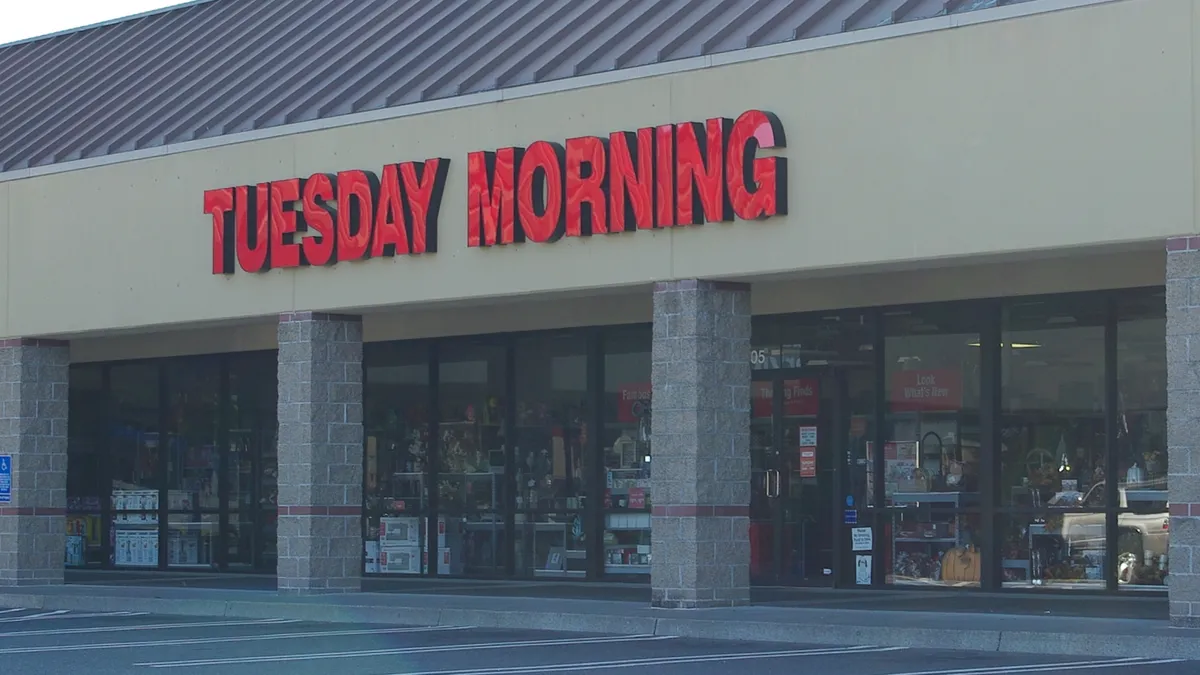Dive Brief:
- Tuesday Morning is formally seeking bids for its assets in bankruptcy, according to court papers.
- With court approval, the retailer set a bid deadline of Oct. 19. If multiple bids come in, Tuesday Morning plans to hold an auction starting Oct. 21, with a court hearing to consider approval of the sale set for Oct. 29.
- The off-price retailer filed for bankruptcy initially with the stated intent of reorganizing in Chapter 11. The court-approved sale procedures still allow for a reorganization.
Dive Insight:
Tuesday Morning is exploring its options. A sale was left open as a possibility in the early days of the retailer's bankruptcy, but leading up to then it also sought financing sources that could fund a reorganization of the retailer. Now a formal sale is underway while a reorganization lingers as an option. In other words, the book is still open on Tuesday Morning's future.
The committee of Tuesday Morning's unsecured creditors welcomed the company's move to offer itself up for a sale after raising concerns that the retailer's executives might pursue a stand-alone reorganization in order to preserve their jobs and stock holdings in the company. A sale process, the committee said in court papers, allows "the market to speak" on whether a sale or reorganization makes most sense. Yet the creditors had objected to what they called Tuesday Morning's "absolute unfettered right to unilaterally pivot from a sale process to a plan of reorganization."
The off-price retailer goes back to the mid-1970s, when Lloyd Ross threw open the doors to a warehouse in Dallas with leftover inventory from brands and retailers, and invited the public to come shop at discount prices.
That is essentially still the foundation of the off-price model. But the landscape has changed drastically since then. Ross opened his store a few years before the first T.J. Maxx store. Today, the sector is dominated by the TJX Cos. juggernaut, Ross Stores and, to a lesser degree, Burlington.
By the time Tuesday Morning filed for bankruptcy, it had nearly 700 stores (with plans to close a third of them) and did around $1 billion in sales. That's not small, but it has also racked up tens of millions of dollars in losses in recent years as it tried to compete in the off-price space, against large ever-growing competitors.
GlobalData Retail analysts noted this spring that the retailer had many subpar locations that lack visibility. Moreover, they described some of those stores as a "jumbled flea market."
"While consumers do not expect off-price discount retailers to have a perfectly curated selection of merchandise, they do demand that the range is reasonably coherent and contains interesting finds," the analysts said in May, shortly after the retailer filed for bankruptcy. "Unfortunately, Tuesday Morning often fails to deliver this."
Those problems, combined with the steep challenges of COVID-19, left it in a financial tailspin that sent it into bankruptcy.
Even so, there's still an underlying business that is potentially of interest to a buyer. Tuesday Morning's comparable sales ticked up modestly in 2019, which is lackluster in a booming off-price sector but is still better than many retailers can say for their business. Slimming down the company's balance sheet and store footprint could leave a profitable retailer going forward.















